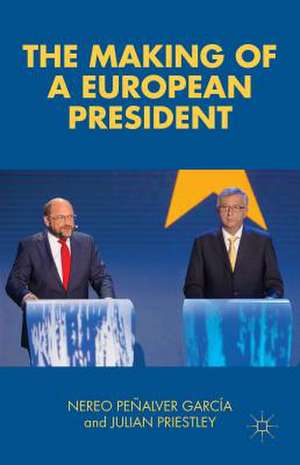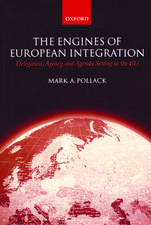The Making of a European President
Autor Nereo Peñalver García, Julian Priestleyen Limba Engleză Hardback – 24 apr 2015
Preț: 388.34 lei
Nou
Puncte Express: 583
Preț estimativ în valută:
74.32€ • 76.77$ • 61.85£
74.32€ • 76.77$ • 61.85£
Carte tipărită la comandă
Livrare economică 26 martie-09 aprilie
Preluare comenzi: 021 569.72.76
Specificații
ISBN-13: 9781137476739
ISBN-10: 1137476737
Pagini: 218
Ilustrații: XVI, 218 p.
Dimensiuni: 140 x 216 x 14 mm
Greutate: 0.42 kg
Ediția:2015
Editura: Palgrave Macmillan UK
Colecția Palgrave Macmillan
Locul publicării:London, United Kingdom
ISBN-10: 1137476737
Pagini: 218
Ilustrații: XVI, 218 p.
Dimensiuni: 140 x 216 x 14 mm
Greutate: 0.42 kg
Ediția:2015
Editura: Palgrave Macmillan UK
Colecția Palgrave Macmillan
Locul publicării:London, United Kingdom
Cuprins
List Of Contents List Of Abbreviations Introductory Notes From The Authors Acknowledgments About The Authors Prologue PART I: THE FRAGILE STATE OF THE UNION, 2014 1.1. A Portrait Of The Union After Six Years Of Crisis 1.2. A Union Falling Asunder? The Increase In Divisions Between And Within Member States 1.3. The Increasing Gap Between Citizens And Politicians Notes Chapter One PART II: TAKE ME TO YOUR PRESIDENT (1) - OR WHAT IS THE ROLE OF THE PRESIDENT OF THE COMMISSION? 2.1. The Nature Of The Beast- Regulatory Authority Or Political Executive? 2.2 The Chosen Men And How They Got There 2.3. A Presidency Or A Primus Inter Pares? The Changing Role And Style Of The Commission Presidency 2.4. Restructuring An Enlarged Commission? 2.5. All The President's Men (And Woman) Conclusion Notes Chapter Two PART III: A MODEST PROPOSAL (1): HOW THE IDEA OF LEAD CANDIDATES EMERGED 3.1 How The Argument Plays Out 3.2. How Appointing The Commission President Has Changed In Principle And In Practice 3.3. How The Link With The Elections Ended Up In The Treaty. 3.4. How The Jump Was Made From A Link To The Elections To A First Presidential Election Notes Chapter Three PART IV: THE IDEA ENTERS THE POLITICAL ARENA 4.1. European Political Parties, The Broadest Of Churches 4.2. The First Tentative Steps 4.3. The Socialist Conversion 4.4. The Parties Play Catch Up 4.5. The Commission Gives Its Blessing Notes Chapter Four PART V: HOPEFULS AND RUNNERS - ABOUT THE CANDIDATES 5.1. The Parties Make Their Picks Notes Chapter Five PART VI: ON THE ROAD 6.1. The Staggering Challenge Of A Pan-European Campaign 6.2. Behind The Scenes In The Campaigns 6.3. The Candidates On Tour 6.4. What The Candidates Said 6.5. Some Controversy On The Campaign Trail 6.6. The Debates 6.7. Media And Communication: Something Is Different This Time Notes Chapter Six PART VII: DECONSTRUCTING THE RESULTS Notes Chapter Seven PART VIII: THE LADY IS FOR TURNING (1) OR HOW THE BATTLE WAS WON BOX Notes Chapter Eight PART IX:AN EXPERIENCE TO BE REPEATED? WHAT HAPPENED HERE AND WHAT HAPPENS NEXT? 9.1. What Changed? 9.2. What Can Change And Should Change Next Time? Notes Chapter Nine
Recenzii
“The authors possess a great feel for the minutiae of European politics and provide an excellent account of this important EU institutional development. Summing Up: Recommended. Upper-division undergraduate, graduate, and research collections.” (P. Kurzer, Choice, Vol. 53 (6), February, 2016)
"Well worth your time to read" - Professor JHH Weiler, President of the European University Institute, Florence and inter alia Professor, NY Law School
"This book provides a unique insight into an unprecedented event: even after many decades in politics, this campaign made me fall in love with Europe all over again. It was a first in history: a battle for Europe, but fought with words, not weapons." Jean-Claude Juncker, President of the European Commission
"This book by the Parliament's former Secretary General, Julian Priestley, and Nereo Peñalver is ambitious in its scope. It places the spitzenkandidaten process and the 2014 election campaign in a wider historical perspective; the changing role of the Presidency of the Commission, its greater democratic accountability to the European Parliament and the development of European political parties. It assesses what changes now in the balance of power between the EU institutions and what might happen next time around. They have spoken to all of those who played key roles, both in pushing the idea of a presidential campaign and in the elections themselves. And they tell the story of a profound change in the way the EU picks its leadership." Martin Schulz, President of the European Parliament
"Last June, the European Union had a constitutional coup that changed forever the political balance of power within it in favour of openness and democracy. No more will the EU presidency be a retirement bonus for failed or feeble prime ministers, but instead will be fought for across the EU by Euro pean parties promoting their political vision via a chosen standard bearer, all designed to win a majority in the Euro pean Parliament (EP) electoral college. How this came to pass and why it went virtually unnoticed is the subject of this succinct study." - Glynn Ford, Tribune
"Well worth your time to read" - Professor JHH Weiler, President of the European University Institute, Florence and inter alia Professor, NY Law School
"This book provides a unique insight into an unprecedented event: even after many decades in politics, this campaign made me fall in love with Europe all over again. It was a first in history: a battle for Europe, but fought with words, not weapons." Jean-Claude Juncker, President of the European Commission
"This book by the Parliament's former Secretary General, Julian Priestley, and Nereo Peñalver is ambitious in its scope. It places the spitzenkandidaten process and the 2014 election campaign in a wider historical perspective; the changing role of the Presidency of the Commission, its greater democratic accountability to the European Parliament and the development of European political parties. It assesses what changes now in the balance of power between the EU institutions and what might happen next time around. They have spoken to all of those who played key roles, both in pushing the idea of a presidential campaign and in the elections themselves. And they tell the story of a profound change in the way the EU picks its leadership." Martin Schulz, President of the European Parliament
"Last June, the European Union had a constitutional coup that changed forever the political balance of power within it in favour of openness and democracy. No more will the EU presidency be a retirement bonus for failed or feeble prime ministers, but instead will be fought for across the EU by Euro pean parties promoting their political vision via a chosen standard bearer, all designed to win a majority in the Euro pean Parliament (EP) electoral college. How this came to pass and why it went virtually unnoticed is the subject of this succinct study." - Glynn Ford, Tribune
Notă biografică
Nereo Peñalver is a European Union official, currently working at the Foreign Affairs Committee of the European Parliament. Previously he served as adviser to European politicians such as Martin Schulz, President of the European Parliament, and Josep Borrell, former President of the European Parliament. He also worked for senior EU officials and at the EU delegation in Tunisia. He has Masters from the College of Europe in Bruges and from Pompeu Fabra University in Barcelona.
Julian Priestley was Secretary General of the European Parliament from 1997 to 2007, and is a former Secretary General of the Socialist group at the EP. He studied at Balliol, Oxford and is a past President of the Oxford Union. He has written extensively on European and British politics. His books include, 'Six battles that shaped Europe's Parliament' (2008) and 'Europe's Parliament; People, Politics and Places', (with Stephen Clark) (2012). He was knighted in 2007. He was special adviser to Martin Schulz'presidential campaign in 2014.
Julian Priestley was Secretary General of the European Parliament from 1997 to 2007, and is a former Secretary General of the Socialist group at the EP. He studied at Balliol, Oxford and is a past President of the Oxford Union. He has written extensively on European and British politics. His books include, 'Six battles that shaped Europe's Parliament' (2008) and 'Europe's Parliament; People, Politics and Places', (with Stephen Clark) (2012). He was knighted in 2007. He was special adviser to Martin Schulz'presidential campaign in 2014.



















